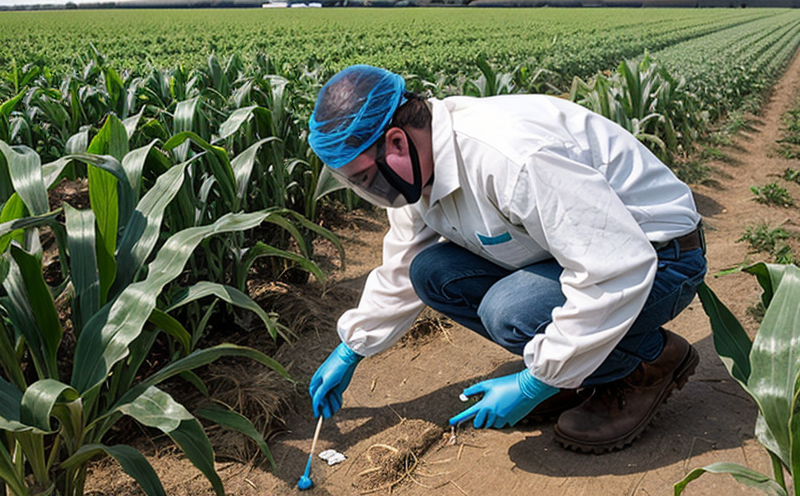Fipronil Residue Testing in Crops
Fipronil is a widely used insecticide that has been implicated in various environmental and health concerns. In agricultural applications, it targets pests such as aphids, cockroaches, and termites. However, the presence of fipronil residues above acceptable limits can pose significant risks to human health and the environment. This service provides comprehensive testing for fipronil residue levels in crops, ensuring compliance with international standards and regulatory requirements.
Our laboratory employs advanced analytical techniques to detect even trace amounts of fipronil in various crop samples. By leveraging state-of-the-art instrumentation, we offer precise and reliable results that are crucial for maintaining the integrity and safety of agricultural produce. This service is particularly important as it helps stakeholders adhere to stringent regulatory guidelines set by organizations like the World Health Organization (WHO), Food and Agriculture Organization (FAO), and various national authorities.
The process begins with meticulous sample preparation, ensuring that all components are representative of the entire batch being tested. Once prepared, samples undergo rigorous analysis using high-performance liquid chromatography (HPLC) coupled with mass spectrometry (MS/MS). This method provides accurate quantification, even at very low concentrations.
To ensure consistent and reliable results, our laboratory adheres to a strict quality assurance protocol that includes regular calibration of instruments, participation in proficiency testing programs, and continuous training for personnel. The analytical methods used are validated according to international standards such as ISO 17025, which ensures the accuracy and precision of our tests.
In addition to ensuring compliance with regulations, this service plays a vital role in protecting consumer health by identifying potential hazards early on. By detecting fipronil residues at levels that could exceed acceptable limits, we contribute significantly to maintaining food safety standards globally.
Our clients include quality managers, compliance officers, research and development engineers, and procurement teams who rely on accurate residue data for decision-making processes related to product certification, marketing strategies, and supply chain management. Providing reliable fipronil residue testing results is essential not only for regulatory compliance but also for enhancing trust among consumers regarding the safety of agricultural products.
Applied Standards
| Standard Reference | Description |
|---|---|
| ISO 18564:2009 | Determination of fipronil in food by liquid chromatography-tandem mass spectrometry (LC-MS/MS) |
| AOAC International Method 2007.08 | Determination of fipronil and its metabolites in plant tissues and other commodities using gas chromatography-mass spectrometry (GC-MS) |
| EP/163/95 | Guidance on the interpretation of analytical results for fipronil residues in foodstuffs |
International Acceptance and Recognition
The testing methods we use are internationally recognized and accepted by regulatory bodies worldwide. Our laboratory has successfully completed proficiency tests conducted by organizations such as the European Cooperation for Accreditation (EA), International Laboratory Accreditation Cooperation (ILAC), and others, demonstrating our commitment to maintaining high-quality standards.
Our clients can trust that their test results will be widely accepted across different countries and regions due to the rigorous validation processes we follow. This ensures that any findings from our fipronil residue tests are credible and can be used effectively in international trade negotiations or when seeking certification from various governmental bodies.
Environmental and Sustainability Contributions
- Reduces contamination risks associated with high levels of pesticides, promoting safer agricultural practices.
- Supports sustainable farming by ensuring that crops are free from harmful residues.
- Promotes responsible use of chemical inputs in agriculture, which contributes to reducing overall environmental impact.
- Aids in early detection and mitigation efforts for potential health issues linked to pesticide exposure.
By offering this service, we contribute positively towards achieving sustainable development goals by ensuring that agricultural products meet strict safety standards. Our efforts help protect both human health and the environment from the negative effects of improper pesticide use.





